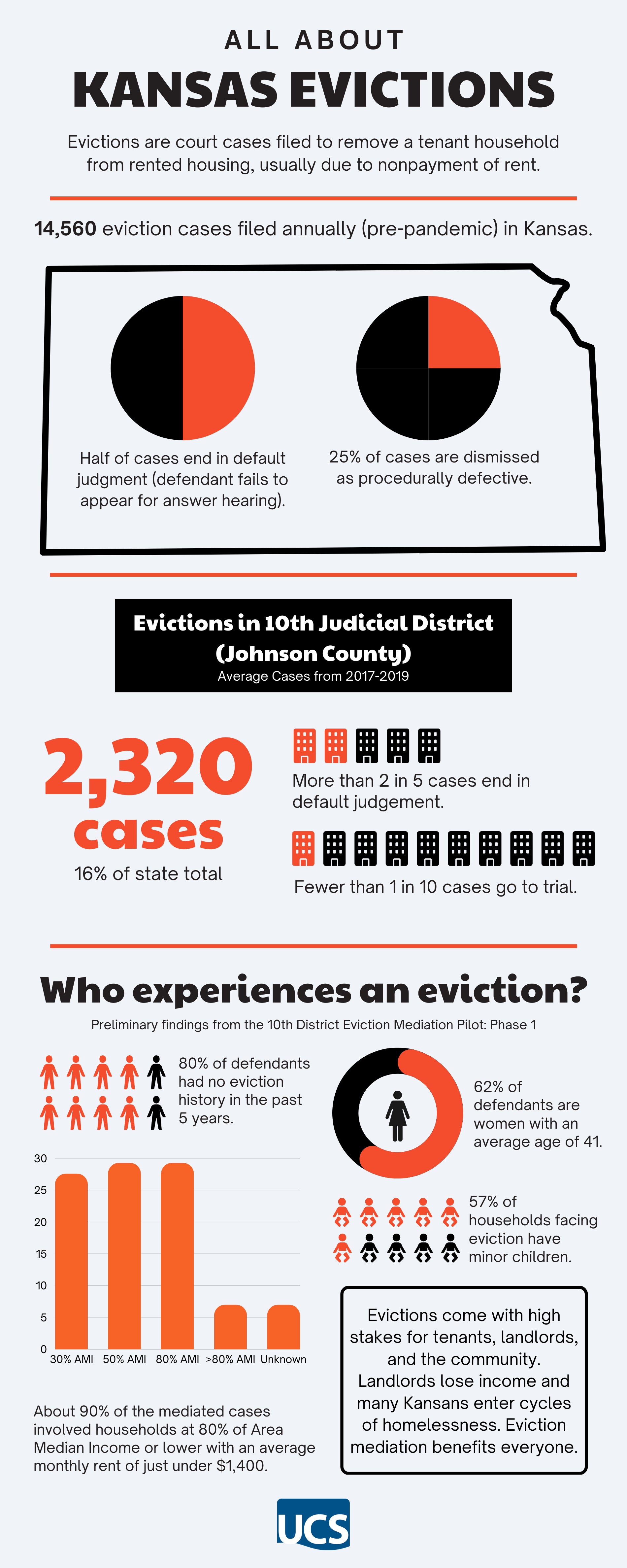Johnson County’s Eviction Mediation Pilot: A Promising Approach to Mitigating Evictions and Homelessness
Evictions are court cases filed to remove a tenant household from rented housing, usually due to nonpayment of rent. Evictions have high stakes for tenants, landlords, and the community. Landlords lose income and many Kansans lose housing, sometimes leading to people entering cycles of homelessness. Once an eviction judgment is entered, Sheriff’s deputies are sent to physically remove or bar tenants from returning to the property. Additionally, eviction judgments present a near absolute barrier to housing for many renters: In Kansas, evictions never come off a renter’s court record and most landlords will not rent to someone who has had an eviction judgment. Before the pandemic, Kansas courts saw an average of 14,560 eviction cases filed each year.
During the COVID-19 pandemic, eviction became a household word. At the start of the pandemic, the Center for Disease Control and Prevention (CDC), prohibited the filing of evictions as a matter of public health and safety to limit the spread of COVID. When the ban on evictions was lifted, federal Emergency Rental Assistance funds (known as KERA in Kansas) were available to support many households that had fallen behind on rent and were about to experience eviction. After KERA funds were spent, leaders in Johnson County government and court staff were invested in continuing to address evictions.
According to United Way’s Asset-Limited, Income-Constrained, Employed (ALICE) model, 12% of Kansans live below the federal poverty level and 39% of employed Kansans aren’t making enough money to pay for basic necessities. With pressures from inflation and increased housing costs in the past few years, evictions are up across the country. In Johnson County’s 2023 Point-in-Time count, 23% of households indicated that a recent eviction was a reason that they were currently homeless.
In September 2023, with the support of Johnson County Government and the efforts of Court Administrator Laura Brewer, Judge John McEntee, and many court staff, the Johnson County 10th District Court launched an Eviction Mediation Pilot. This pilot builds on the research done by the Ad Hoc Committee on Eviction Best Practices appointed by the Kansas Supreme Court during the pandemic and led by Appellate Judge Sarah Warner.
The 10th District was thoughtful in its approach, meeting with local attorneys, nonprofit agencies, and county staff to shape the Pilot and to determine what data collection would be necessary to track cases and measure outcomes. Johnson County Government provided funding for part-time, experienced small claims mediators and the court utilizes a Resource Navigator to provide support for these cases.
The first phase of the 10th District pilot lasted about 90 days and experienced marked success: 181 eviction cases were filed and 94 of these were referred to mediation because the defendant appeared at the answer hearing and indicated s/he did not agree with the eviction filed. Remarkably, 85% of mediated cases reached an agreement about rent due and/or possession of the rental unit and in 75% of those cases, no judgment has been filed.
Preliminary data shows that tenants facing eviction tend to be lower-income, women of color, and have minor children. About 90% of the mediated cases involved households at 80% of Area Median Income or lower with an average monthly rent of just under $1,400. More women than men were experiencing eviction, most tenants were individuals of color, and more than half have minor children. Avoiding an eviction judgment through this Pilot reduces barriers to tenants finding stable housing, reducing housing disparities. The Pilot also supports landlords in obtaining past due rent and/or possession of the rental unit without the intervention of law enforcement.
The Eviction Mediation Pilot continues and is being expanded through 2024. Not only will more eviction cases be eligible for mediation, Johnson County Government has set aside $500,000 in COVID-relief for rental assistance to support tenants and landlords participating in the Pilot.
For more information, reach out to Christina Ashie Guidry, UCS Director of Policy & Planning, christinag@ucsjoco.org.

UCS Receives $13,000 Grant to Enhance Homeless Services Capacity

United Community Services of Johnson County (UCS) received a $13,000 capacity building grant from Sunflower Foundation to bolster its core operating capacities. The grant aims to provide flexibility and time to strengthen internal capacity, better serve communities, and increase impact. It also offers opportunities for high-caliber learning collaboratives and skill-building workshops.
As the lead agency for the Johnson County Continuum of Care on Homelessness (CoC), UCS will use the grant to enhance the capacity of the Homeless Management Information System – the community-wide data system for tracking individual-level data, program outcomes, and CoC-wide outcomes. The goal is to reduce barriers to access for non-funded agencies, increase participation, and explore ways to track additional system data for a fuller picture of homelessness in the county. UCS will partner with persons with lived experience of homelessness from the CoC’s Lived Experience Advisory Board to ensure person-centered changes and promote better outcomes.
The funding opportunity focused on organizations serving diverse populations, providing a wide range of services, and prioritized based on need, underserved community focus, and limited access to resources. A diverse team of experts reviewed applications thoroughly. To learn more about the capacity building program and see a full list of this year’s grantees, go to the Capacity Building Grants web page.
